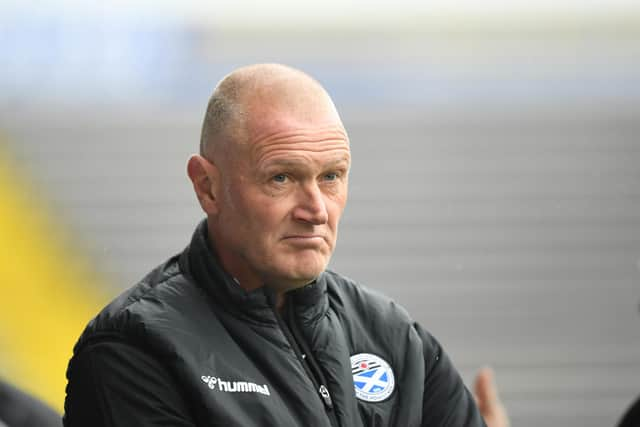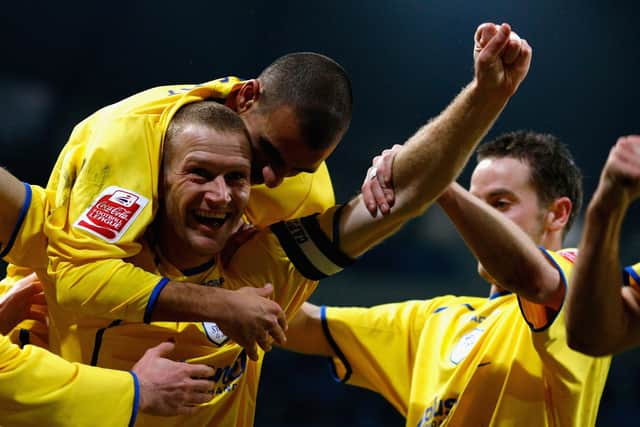Lee Bullen: Sheffield Wednesday legend and Scottish football's forgotten man now reviving its forgotten club
Including some of the words peppering his conversation at Somerset Park today, though, might be more tricky. After all, what rhymes with “nuance”, “subliminal” and “quirk”? But, while the manager isn’t using them to describe his strange and exotic career in the game, they can almost apply.
Nuance, as in minute variations in tone: that was his journey, if it could be termed such, from junior team to modest senior outfits and back to the juniors. Subliminal, as in below the threshold of consciousness: that was him, thousands of miles away and forgotten, but building knowledge and experience, “learning about life”.
Advertisement
Hide AdAdvertisement
Hide AdAnd quirk as in quirk of fate. If a pal had suggested, hey, let’s try Australia, but then pulled out of the adventure at the 11th hour, how many of us would have still got on the plane? Bullen did and everything, including him becoming a Sheffield Wednesday legend and right up to currently sitting top of the Scottish Championship, emanated from that bold move.


The 51-year-old was a surprise appointment back in January, Ayr’s third manager of that campaign. “Left-field” it was called, a reference to his nomadic early days of continent-hopping in search of a game of football, having been reluctant to accept that his future lay behind the counter of a building society. At the start of this season the club were many pundits’ tips for relegation.
Bullen is trying not to get carried away. Others in the town can do this but he must stay as calm as its seafront on this balmy late summer’s day. He mentions Jack Ross. “A manager can be acclaimed for a great result in Europe and three weeks later he’s gone. Social media, the intensity of the scrutiny, knee-jerk reactions … they’ve made this job tougher and tougher. It’s a ruthless business right now.”
So why do it? “If managers are either brave or foolish then probably I’d put myself in the latter camp. Really, it’s the love of the game - that’s why we’re here. The love I had at eight years old, ball under my arm everywhere I went, dreaming of becoming the next Kenny Dalglish, has never gone away - despite the rejections and knockbacks.”
There’s something in the air at Ayr and not just the waft of fish and chips.


Behind the scenes, David Smith is the owner who was a fan back in short trousers and Graeme Mathie the go-ahead managing director. And my friend on Somerset Park’s north terracing - soon to be redeveloped - speaks admiringly of Bullen’s “presence” being reminiscent of Ally MacLeod.
Though Ayr last season finished one place above the relegation playoffs for the second year running, the boss was encouraged by “wee shoots of green”. These haven’t fully budded yet, even with the addition of Dipo Akinyemi’s barnstorming striker play and his goals, and their fine start is simply and merely that. But Bullen reckons they’re headed in the right direction.
Where to, exactly? “We’re being realistic,” he says. “Although there was a great charge a few years ago when Bill Barr was the chairman and Ian McCall the manager, 11 of the last 18 seasons have been spent in the division below. The ambition is to get into the [Premiership] but we don’t foresee that happening right now.” There’s a pause and the hint of a smile, then he adds: “We’re all acutely aware of how close Arbroath came to winning the Championship last season. So … why don’t we have a go?”
Advertisement
Hide AdAdvertisement
Hide AdReally, Bullen has come from several fields beyond left-field. Since being let go as a player by Dunfermline Athletic, Meadowbank Thistle and Stenhousemuir, he has spent more years away from these shores. He was thrilled that, more than a decade after walking out of East End Park, Dunfermline took him back. “I made my father proud,” he says. Bullen’s only regret about returning to the Scottish game a second time following the Sheffield sojourn is that neither of his parents, John and Margaret, is around to witness it.


“Mum and Dad died within six months of each other last year. She had MS and suffered a heart attack. He had Alzheimer’s and was also riddled with cancer. The blessing for me and my two younger brothers is that he didn’t have to battle for much longer with these horrible diseases. In fact we’re convinced Dad had hung on just to see Mum pass. He didn’t want her to be the one left alone.”
Now Bullen is laughing. “Do you know, he possibly couldn’t remember what he’d been doing a few hours before, but he could reel off the Hearts side from the 1968 Scottish Cup final, no bother at all.”
John was a glass blower in Penicuik, Midlothian and good friends with Alex Young, the Hearts idol from the decade before, and together they coached the wannabe young footballers of Eskmill Boys’ Club. “The Golden Vision,” says Bullen who would go on to play for a Hong Kong club called Golden. “Alex was very encouraging to me and of course because of him and Dad I grew up supporting Hearts. I was a Tynecastle ball-boy and, even better, got to ride on the team bus alongside my hero Robbo [John Robertson]. For that I have to thank John Frame, a key man behind the scenes at Tynecastle, a tennis umpire - and my history teacher at school.”
Bullen started out up front. “I always thought I was decent but knew others were better. Then, at the end of the teenage years, some lads had discovered drink and women and were always out on Fridays nights but I’d be at home. Possibly they’d suffered disappointments and become fed up with football but I still had the dream.”
Bullen is a great example of perseverance and not giving up. After being released by Jim Leishman’s Pars, dropping down to Penicuik Athletic, he was given a chance by Terry Christie at Meadowbank and moved on to Stenhousemuir, only to be freed again. At Whitburn, though he enjoyed a run to the Junior Cup final, he thought there was no way back to the senior game.
“I had a job at the Alliance & Leicester in Edinburgh and reckoned that was going to be me. Scottish football is a small world, everyone knows everyone, and I couldn’t see how I was going to get another shot. Then a pal from Whitburn, Billy McPhee, had an idea. His dad knew Joe Watson, a Fifer who became a naturalised Aussie, played against Scotland in the [1985] World Cup [playoff], and was managing a club over there. Billy suggested we try Oz and I was up for it. I said goodbye to my folks and girlfriend at the time but at the last minute my friend called off. What was I to do? It would have been easy to stay, but there was nothing for me in Scotland. Getting on that plane was the best thing I ever did.”
Bullen played for two years Down Under. The football was part-time so he worked in home removals. He embraced the beach lifestyle although was a “crap” surfer. In Hong Kong - four years - he moved around five different clubs, got married, ate shark’s fin soup and snake but passed on the emu. He loved the vibrancy. “Every night was Saturday night there.” None more so than when Terry Venables flew over with his England squad for a Euro 96 warm-up. “They were supposed to thrash my team, Golden, ten-nil but in the end only won by a single goal. I swapped shirts with Tony Adams. Afterwards they wanted to party. We told them to meet us in China Jump - a nightclub in a tower block, seven floors up. Bankers would queue for the dentist’s chair where a waiter chucked vodka and lime down their throats. Gazza [Paul Gascoigne] couldn’t resist. Photos were sold to the tabloids - big scandal. The next time I saw him was a week later at Wembley scoring that wonder goal against Scotland.”
Advertisement
Hide AdAdvertisement
Hide AdBullen had his passport stamped in China, Malaysia, Taiwan and Vietnam and then it was time for him to move again. A diamond mine tycoon said: “Come play for my hometown club in Greece.” Kalamata was another fantastic experience, more beaches, great food, no snakes. The football was explosive, police outriders at all times, bus windows frequently smashed. Our man learned the language and, not for the first time or the last, thought: “I’m from a wee place called Penicuik, I got released by Meadowbank - how did I end up here?”
After two years by the Med, Dunfermline got back in touch: “You must have missed the Lyne Burn.” Says Bullen: “I never thought I’d get the chance to play in Scotland again but Jimmy Calderwood had just taken over and I don’t think there was anyone still at the club who remembered the kid who didn’t cut it the first time. In any case I was a different player, a different person.”
By then back in defence, he helped the Pars return to the top flight, reach the Scottish Cup final and qualify for Europe. After that came Falkirk under John Hughes who he once witnessed express displeasure with a performance at Inverness by kicking over an urn full of soup. Then at 33 Bullen thought his career was winding down and maybe it would be back to the juniors when suddenly and dramatically the call came from Hillsborough.
“I said to myself: ‘What do Sheffield Wednesday want with me?’ Then at the stadium, looking up at the big stand, I was like: ‘Holy cow, this club have fallen far.’ They were in League One, nearly League Two, and the Scottish market was very affordable for them. I was lucky that opportunity happened for me, and it brought me my greatest-ever day as a player.”
Under Paul Sturrock, probably his favourite manager, and in front of 70,000 in Cardiff he captained the Owls to a playoff final triumph in 2005 which was their route back to the Championship. For that, and during another campaign for playing every position including goalkeeper, Bullen was reckoned to possess sufficient Sheffield steel to be voted Wednesday’s greatest-ever skipper, although the honour embarrasses him. “It’s lovely, but given the club’s history there must have been better candidates, although probably no one who voted for me was old enough to remember the FA Cup win back in the 1930s.”
Hillsborough is a special place for him, not least because of the memorial to the 97 fans who died as a result of the 1989 disaster. “Day after day scarves are laid at it. Brian Laws, the Wednesday manager for a while, played for Notts Forest in that game. It’s horrendous to think that so many supporters were waved off but never came back but incredibly moving that the tragedy will never be forgotten, not just in Liverpool but Sheffield, too.”
After all those years of wandering, Bullen made his home in South Yorkshire. Father to two grown-up kids from his marriage, he added twins, now eight, with partner Nicola. He seemed to be in with the Hillsborough bricks having taken on various coaching jobs and three stints as caretaker boss. “If I was going to move, become a manager, it had to be the right place.”
Ayr United, he says, seem to have become the forgotten club of Scottish football. Well, now that the forgotten man has arrived, maybe not any anymore.
Comments
Want to join the conversation? Please or to comment on this article.